

Some can handle stress better than the others.
The term “stress”, as it is currently used was coined by Hans Selye in 1936, who defined it as “the non-specific response of the body to any demand for change”. Selye had noted in numerous experiments that laboratory animals subjected to acute but different noxious physical and emotional stimuli (blaring light, deafening noise, extremes of heat or cold, perpetual frustration) all exhibited the same pathologic changes of stomach ulcerations, shrinkage of lymphoid tissue and enlargement of the adrenals. He later demonstrated that persistent stress could cause these animals to develop various diseases similar to those seen in humans, such as heart attacks, stroke, kidney disease and rheumatoid arthritis. At the time, it was believed that most diseases were caused by specific but different pathogens. Tuberculosis was due to the tubercle bacillus, anthrax by the anthrax bacillus, syphilis by a spirochete, etc. What Selye proposed was just the opposite, namely that many different insults could cause the same disease, not only in animals, but in humans as well.
What is Stress? - The American Institute of Stress. Stress is not a useful term for scientists because it is such a highly subjective phenomenon that it defies definition.
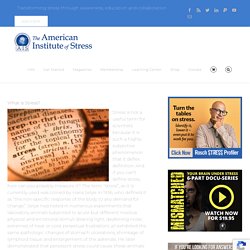
Controlling Stress: Causes of Stress, Reducing Stress, and ... Stress.
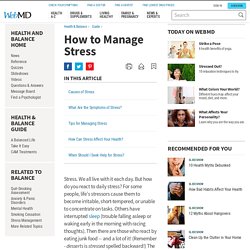
We all live with it each day. But how do you react to daily stress? For some people, life's stressors cause them to become irritable, short-tempered, or unable to concentrate on tasks. Others have interrupted sleep (trouble falling asleep or waking early in the morning with racing thoughts). Then there are those who react by eating junk food -- and a lot of it! Nearly 1 in 3 Adults Feel Extreme Stress. Oct. 25, 2007 -- Nearly a third of U.S. adults report "extreme stress" in a new survey from the American Psychological Association.
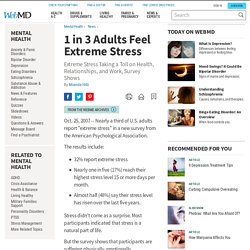
The results include: 32% report extreme stress Nearly one in five (17%) reach their highest stress level 15 or more days per month. Almost half (48%) say their stress level has risen over the last five years. 60% of Singaporean staff experience above average stress levels. Are Singaporean employers doing enough when it comes to health and well-being programmes?
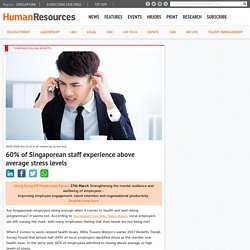
It seems not. According to new research from Willis Towers Watson, local employers are still missing the mark, with many employees feeling that their needs are not being met. When it comes to work-related health issues, Willis Towers Watson’s earlier 2017 Benefits Trends Survey found that almost half (44%) of local employers identified stress as the number one health issue.
Stress in the Workplace. Whatever your work demands, there are steps you can take to protect yourself from the damaging effects of stress, improve your job satisfaction, and bolster your well-being on and off the job.
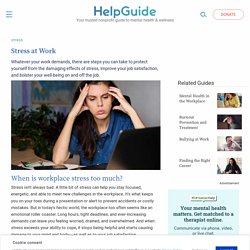
Stress management Stress basics. Stress Management Techniques, Healthy Coping Strategies, Breathing Exercise. Stress management. The American Institute of Stress. Management Tips - The American Institute of Stress. What Is Stress Management? Ever notice that a good laugh has a way of lightening your burdens?
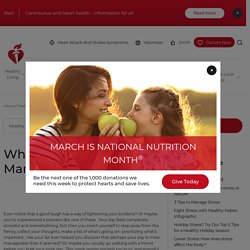
Or maybe you’ve experienced a scenario like one of these. Your day feels completely stressful and overwhelming, but then you coach yourself to step away from the frenzy, collect your thoughts, make a list of what’s going on– prioritizing what’s important. Has your list ever helped you discover that perhaps your day is more manageable than it seemed? Or maybe you usually go walking with a friend before you start your work day.
This week seems entirely too busy and stressful to fit in such “frivolities.” Learn to “pump the brakes” on stress. Workplace Stress - The American Institute of Stress. Although the Institute is often asked to construct lists of the “most” and “least” stressful occupations, such rankings have little importance for several reasons.
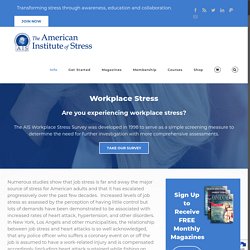
It is not the job but the person-environment fit that matters. Some individuals thrive in the time urgent pressure cooker of life in the fast lane, having to perform several duties at the same time and a list of things to do that would overwhelm most of us — provided they perceive that they are in control. They would be severely stressed by dull, dead-end assembly line work enjoyed by others who shun responsibility and simply want to perform a task that is well within their capabilities. The stresses that a policeman or high school teacher working in an inner city environment are subjected to are quite different than those experienced by their counterparts in rural Iowa. Stress is a highly personalized phenomenon and can vary widely even in identical situations for different reasons. Young adults spend more than six hours per day feeling ‘stressed out’, finds Mental Health study. Young adults spend more than six hours a day "stressed out", a study has found.
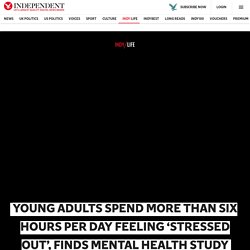
A poll of 1,000 18-25-year-olds found money, appearance and career worries as well as fears about the future mean a large chunk of their time is spent feeling anxious or under pressure. But one in 10 feel they have no-one to turn to discuss their concerns, leaving them to face their fears alone. Download the new Independent Premium app Sharing the full story, not just the headlines A further 67 per cent admitted they had come across problems in their life where they felt they had nobody to lean on for help. As a result, 56 per cent have ended up in more trouble after keeping a problem to themselves rather than confiding in someone else.
The statistics emerged in a study by charity, UK Youth, to launch its #KeepMeSafe campaign, which calls on all organisations working with young people to "look" at their safeguarding policies, "listen" to young people and take action during National Safeguarding Month. 1. 2. 3. 4. Understanding Stress and How It Affects the Workplace. Stress is normal.
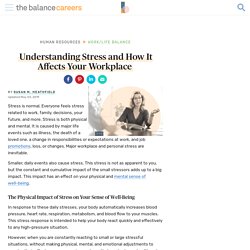
Everyone feels stress related to work, family, decisions, your future, and more. Stress is both physical and mental. Highlights: Workplace Stress & Anxiety Disorders Survey. It comes as no surprise that most working Americans experience stress or anxiety in their daily lives.
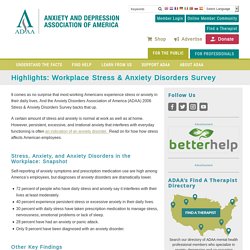
And the Anxiety Disorders Association of America (ADAA) 2006 Stress & Anxiety Disorders Survey backs that up. The Relationship Between Job Stress and Quality of Life Among Working Adults. Mental Health in the Workplace. Any mental illness is defined as having any mental, behavioral, or emotional disorder in the past year that met Diagnostic and Statistical Manual of Mental Disorders IV (DSM-IV) criteria (excluding developmental disorders and substance use disorders). Mental illness can vary in impact, ranging from no impairment to mild, moderate, and even severe impairment. Mindfulness is a psychological state of moment-to-moment awareness of your current state without feeling inward judgement about your situation.
Mindfulness can be achieved through practices foster control and develop skills such as calmness and concentration. Self-management is a collaborative, interactive, and ongoing process that involves educators and people with health problems. The educator provides program participants with the information, problem-solving skills, and tools they need to successfully manage their health problems, avoid complications, make informed decisions, and engage in healthy behaviors. Phwa survey summary. The high price of workplace stress. Sick and tired of your job? You’re not alone. Nearly half (44 percent) of working adults say that their current job affects their overall health, but only 28 percent of those believe that effect is a good one. People with disabilities, in dangerous or low-paying jobs, and those in retail are most likely to say their job has a negative impact on their stress levels (43 percent), eating habits (28 percent), sleeping patterns (27 percent) and weight (22 percent), according to a new survey from the Harvard T.H.
Chan School of Public Health in collaboration with National Public Radio and the Robert Wood Johnson Foundation. There is some good news: Most think work has a positive impact on personal health, but “in almost every case, the negative is significantly greater than the positive,” said the poll’s director, Robert J. “People see their jobs as stress-creating,” and employers simply aren’t doing enough to help, he said. So what can and should employers do? Paloma agreed.